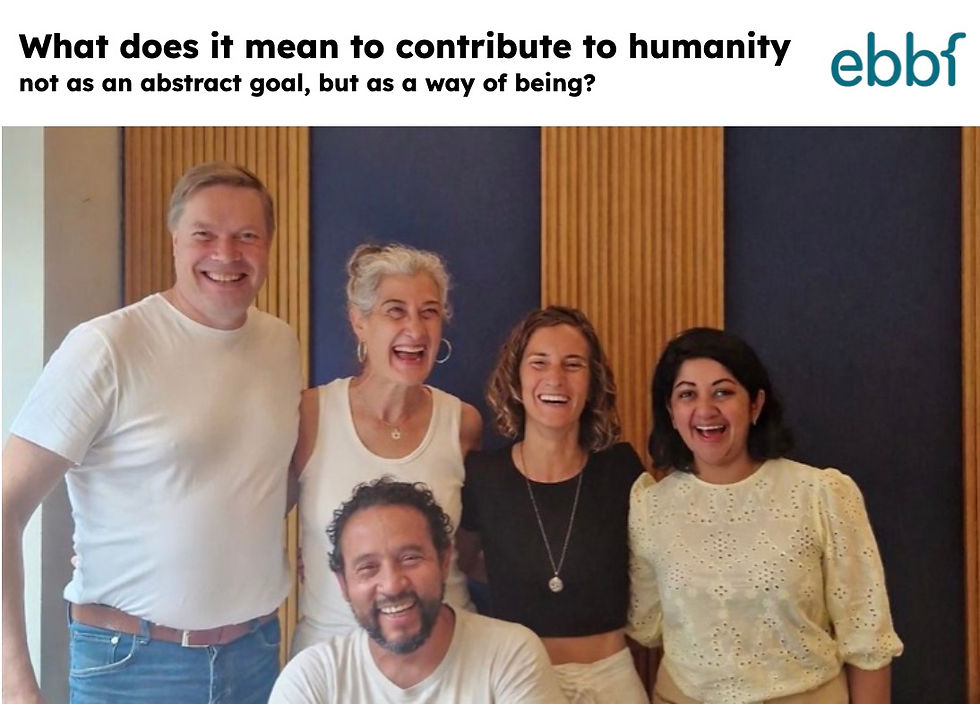Gary Reusche sends a suggested read, mindsets and attitude to help us cope with global population of
- Jan 16, 2017
- 2 min read
One of the longest serving ebbf members,Gary Reusche, sends his suggested read and whilst we have not read nor can vouch for the contents of this book, thinking of the right mindsets, attitudes and actions that will allow the planet to prosper with a population of 11 Billion people looks like something worth reading about.
“I know Paul Hanley for a number of years as I contributed a chapter in his book “Sprit in Agriculture” published in 2005. Still, when I read the promotional material about “Eleven” I had my doubts about liking the book. I was of the opinion that my view of world events was too radical. Perhaps, I thought, I was becoming cynical, especially of do-gooders espousing feel-good solutions to the ever growing list of catastrophic issues facing the planet. Increasingly believed that “unimaginable horrors precipitated by humanity’s stubborn clinging to old patterns of behavior” was the direction the world was inexorably heading.
The thematics of consumerism and classic conspiracy theory have been part of my life since the 60s and 70s. I was “counter-culture”, rejecting excessive materialism and espousing a minimalist lifestyle—- whenever possible in a rural setting. I was introduced to the Baha’i Faith and my Baha’i mentor lead me to agriculture and the community of Brenton Woods when I was a university drop-out on my way to an “easy rider” lifestyle and service activities in communes. In short, for someone like me, I did not expect “Eleven” to be inspiring. I was wrong. It is a wonderful and readable book which collects and explain in straightforward language the intentionally designed prison of consumerism and its overwhelming impact on our everyday lives. Paul lays out the facts to show that consumerism is a constructed version of reality as false as anything in fiction. “Between the lines” Paul also inserts a perspective on the rationale of the world-wide activities of the Baha’i community. Reading “Eleven” will give many Baha’is and non-Baha’is additional motivation and understanding regarding the critical need for the transformation of human society and especially moral education of children and youth. “Eleven” describes an obvious truth, that consumerism is the new “opiate of the people”. Consumer goods “come to define us and symbolize who we are….”, and how far such a self-image is a perversion of our true self, our spiritual self. “Eleven” brings another needed perspective on the long-term evolution of inequality, the concentration of wealth, and the prospects for endless economic growth. It drives hard the point that current trends not only require a spiritual solution to the economic problems, but that the survival of the planet is at stake. “Eleven” in many places indicates with facts and figures that civilization may be proving ”as prolific a source of evil as it had been of goodness….” The consumer economy which is supported by the business community is based on an ethos of never-ending growth. This false god has become the accepted norm. Eleven describes that the underlying paradigm of the consumer culture is invisible which makes it so powerful. Ultimately, it will become apparent that the transformation to a post-growth, post-consumer society is not a project to be achieved by means of economic policy and technology so much as changing our mental infrastructure. The processes that will make this deeper transformation possible are the main theme of “Eleven.” Only reducing consumption and renouncing the paradigm of continuous economic growth— only abandoning the materialists’ crusade— offers hope. ebbf members should become an active participant in the necessary transformative process that is ultimately nothing less than the salvation of the planet.”
Eleven, new book by Paul Hanley http://www.elevenbillionpeople.com







Comments